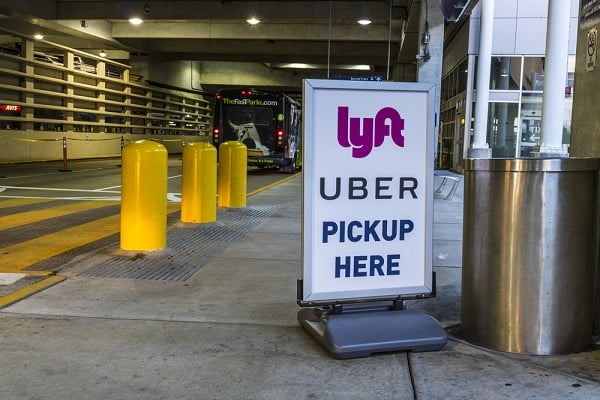 Forboth Uber and Lyft, the prospect of being compelled in their homestate to completely overhaul how drivers are compensated is anexistential threat. (Photo: Shutterstock)
Forboth Uber and Lyft, the prospect of being compelled in their homestate to completely overhaul how drivers are compensated is anexistential threat. (Photo: Shutterstock)
Faced with legislation in California that endangers theirbusiness model, Uber Technologies Inc. and Lyft Inc. are urging acompromise that would keep their drivers from being consideredemployees.
|“We can make independent work better if we update century-oldemployment laws,” Uber Chief Executive Officer Dara Khosrowshahiand Lyft co-founders Logan Green and John Zimmer wrote in a rare,jointly written opinion column published Wednesday in the SanFrancisco Chronicle. “Many drivers are offering ideas to improvetheir experience, and companies like ours have a responsibility tocome to the table prepared to do our part.”
|Related: Uber and Lyft drivers to strike: A new labormovement?
|The executives' public appeal follows months of private effortsby the ride-share giants and other companies to secure support fromCalifornia's governor, state lawmakers, and labor leaders for somedeal to shield them from a sweeping 2018 state supreme court ruling that makes itdifficult for firms to claim their workers aren't employees.
|Whether Uber and Lyft drivers remain independent contractors ormust be treated like employees goes to the heart of the on-demandeconomy's reliance on a casual labor force to keep costs down. Forboth companies, which just went public, the prospect of beingcompelled in their home state to completely overhaul how driversare compensated is an existential threat.
|Under the April 2018 ruling known as Dynamex, workers areemployees entitled to state wage-law protections unless they areconducting “work that it outside the usual course” of the company'sbusiness. For companies whose core service is transportingcustomers via an army of drivers they claim are all contractors,that could be a challenging test to pass.
|In their Wednesday op-ed column, Khosrowshahi, Green and Zimmersay drivers value the flexibility that comes with being treated ascontractors. “Very few jobs allow you to start or stop workingwhenever, wherever, as often as you want,” they wrote. Rather thanforcing the companies to classify them as employees, they say,California should embrace an alternative: Let them keep treatingdrivers as contractors, but guarantee the drivers some minimum payduring the time they're picking up and dropping off passengers;create a company-supported benefits fund for perks like paid timeoff; and establish an association for drivers to advocate forfurther improvements.
|“Today in California,” they write, “we have an opportunity towork with legislators and labor groups to find a different solutionthat preserves drivers' ability to work independently if theychoose to do so while improving the quality and security of theirwork.”
|Platform companies in industries like food delivery, as well asthe ride-hail firms, have also been discussing similar proposalswith leaders of unions, including affiliates of the InternationalBrotherhood of Teamsters, Service Employees International Union andUnited Food & Commercial Workers, according to people familiarwith the discussions.
|Vikrum Aiyer, Postmates vice president of global public policy,said the company has found some in labor to be “willing to at leastbrainstorm with us” and to “coalesce around what the contours of abetter social contract can be,” something he said he hopes couldbecome a national model.
|Union leaders declined to directly discuss the status of theirtalks with gig companies.
|Rights, benefits
“Every single worker in California deserves the right toorganize, a living wage, benefits like health care and retirement,and a voice to set standards in their industry,” Doug Bloch,political director for a regional Teamsters chapter, said in anemailed statement. “We are committed to supporting gig workers intheir fight for all those things.”
|Bob Schoonover, president of SEIU California, said gig-economyworkers “have gotten the short end of the stick for too long.”Their activism, he said, has “created momentum that can't bedenied, and the companies they work for now recognize they must dobetter.”
|Some labor leaders are cool to compromises like the one putforward Wednesday by Uber's and Lyft's executives.
|Such terms are “woefully short of the protections gig workersare entitled to under current law,” Steve Smith, a spokesman forthe state's AFL-CIO chapter, said in an emailed statement.
|Cesar Diaz, legislative and political director for California'sbuilding and construction trades council, said deals cut withapp-based companies risk undermining labor standards much morebroadly.
|“Any deal that makes a worker who is justifiably an employeeinto an independent contractor — taking away their benefits andprotections in current law today — is a bad deal,” he said.
|In May, California's Democrat-dominated state assembly passedlegislation that, if approved by the state senate and governor,would codify the Dynamex ruling's broad definition of an employeeand apply it, with exceptions, to a wide swathe of state laws.
|Newsom review
California Governor Gavin Newsom, also a Democrat, has beenmeeting with labor leaders and executives from major gig companiesabout the issue, according to people familiar with the matter.Newsom spokesman Brian Ferguson said that if the legislationcodifying Dynamex reached his desk, “it would be evaluated on itsown merits.”
|Whatever happens in California will reshape the national debateover the rights and roles of gig workers.
|Democrats in Congress, including six senators running forpresident, last month sponsored a bill that would make a test likeDynamex's the standard for which workers have the right to unionizeunder federal law.
|“Clearly this whole movement to quote-unquote independentcontractors has been a way to skirt the basic protections thatworkers are entitled to,” Vermont Senator Bernie Sanders said in aninterview last week. Sanders has asserted on Twitter that Uber andLyft drivers are employees,
|In an April filing for its initial public offering, Uber saidthat requiring its drivers to be treated as employees “wouldrequire us to fundamentally change our business model, andconsequently have an adverse effect on our business and financialcondition.”
|“Our companies are no longer upstarts,”the Uber and Lyftexecutives wrote in their Wednesday op-ed. “We are public companiesthat tens of millions of people rely on for mobility and for work.If there ever was a time for new policies, it's now.”
|–With assistance from Eric Newcomer.
|Read more:
- Uber settles thousands of driver misclassificationclaims
- Employers could win big on latest DOL gig workerdecision
- Gig workers' importance to grow over next 5years
|
Copyright 2019 Bloomberg. All rightsreserved. This material may not be published, broadcast, rewritten,or redistributed.
Complete your profile to continue reading and get FREE access to BenefitsPRO, part of your ALM digital membership.
Your access to unlimited BenefitsPRO content isn’t changing.
Once you are an ALM digital member, you’ll receive:
- Critical BenefitsPRO information including cutting edge post-reform success strategies, access to educational webcasts and videos, resources from industry leaders, and informative Newsletters.
- Exclusive discounts on ALM, BenefitsPRO magazine and BenefitsPRO.com events
- Access to other award-winning ALM websites including ThinkAdvisor.com and Law.com
Already have an account? Sign In
© 2024 ALM Global, LLC, All Rights Reserved. Request academic re-use from www.copyright.com. All other uses, submit a request to [email protected]. For more information visit Asset & Logo Licensing.








